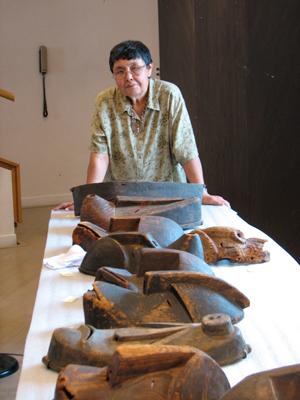
In the winter of 1872 a young French anthropologist, Alphonse Pinart, traveled the Kodiak archipelago by skin boat, assembling one of the most extensive collections of Alutiiq ceremonial masks in the world. Owned by the Château Musée Boulogne-sur-Mer, a municipal museum in northern France, the collection has not been extensively exhibited. In May 2008, 34 of these Alutiiq ceremonial masks traveled to be exhibited at The Alutiiq Museum in Kodiak, Alaska. Koahnic Broadcast Corporation and Dmae Roberts have created “Coming Home: The Return of the Alutiiq Masks” to document this important moment and the variety of personal and cultural stories it weaves together.
Only a decade ago, Alutiiq children knew little of their ancestor’s world. Today, the Alutiiq people are in the midst of a cultural resurgence, developing traditional language programs, re-creating stories, dances and songs, and creating new artworks from rediscovered traditions including masking, which holds a central position in traditional Alutiiq culture.
"When the Russians came, they called everybody in Alaska 'Aleuts,' and that's a name for indigenous people in Siberia. And so, since we looked like the people in Siberia, dark skin, dark hair, most everybody here in Alaska ended up with the name Aleut. And from that word came the word Alutiiq, and the elders decided we were going to stay with the name Aleut, and so there was a division of what we should call ourselves, so they settled on Alutiiq. But our real name is Sugpiaq, and it means the real people."
- Sugpiaq Artist Helen Simeonoff

Sugpiaq Artist Helen Simeonoff
Photo by Sven Haakanson, The Alutiiq Museum
More about the Journey of Alaska's Alutiiq people:
The term "Alutiiq" is used to refer to both the language and culture of the group of Alaska Native people indigenous to the Kodiak Island Archipelago, the southern coast of the Alaska Peninsula, Prince William Sound, and the lower tip of the Kenai Peninsula. Ancestors of the present-day Native Alaskan residents of the Alutiiq culture area have continuously inhabited the area for at least 7,000 years.
For almost 250 years, the Alutiiq people have endured powerful forces of change. In the late 1700's a Russian outpost was established on Kodiak and Alutiiq people were forced to work as virtual slaves for the Russian fur companies. Over time, with the arrival of Russian Orthodox missionaries, life in the Russian colony became less harsh. Russian customs, language, and Orthodox religion were gradually accepted and Russian and Alutiiq traditions endured alongside each other.
The United States took control of Alaska in 1867 and The U.S. government established public schools where the Alutiiq language and the adopted Russian Orthodox traditions were forbidden. Children were to be American - not Alutiiq or Russian. The impact of forced acculturation upon the Alutiiq people was compounded by several Twentieth century disasters. In 1912 a huge volcanic eruption forced residents to flee villages on the Alaska Peninsula and resettle elsewhere. In 1964, a large earthquake rocked the Gulf of Alaska region, and the villages of Afognak, Kaguyak, Old Harbor, and Chenega were destroyed by tidal waves. Another disaster struck in 1989, when oil from the Exxon Valdez oil spill reached almost every Alutiiq community.
In 1871, Alphonse Pinart, a young French linguist, traveled to Alaska to study Native cultures. Pinart collected scores of Alutiiq objects, including ceremonial masks. His collection has miraculously survived for more than a century and through two world wars at The Chateau Musee at Boulogne-sur-Mer in France. When Alutiiq masks were created, a song would be created for the mask. Pinart recorded portions of these songs in his journals. These masks, removed from Alaska just at the point in history that the United States was beginning its policies of forced acculturation, represent an unmatched store of Alutiiq ancestral information and inspiration.
For more info about Alutiiq peoples and the Masks exhibit
visit the Alutiiq Museum in Kodiak, Alaska.
http://alutiiqmuseum.org/
©2008 Koahnic Broadcast Corporation • web design by Clark Salisbury
